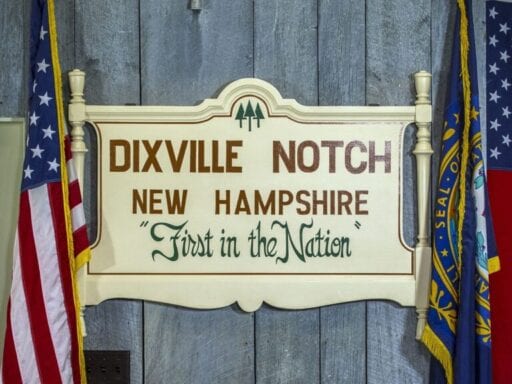Voters in three towns headed to the polls at midnight.
A handful of New Hampshire primary voters were truly first in the nation: Three rural New Hampshire towns — Dixville Notch, Millsfield, and Hart’s Location — opened their polls at 12:01 am on Tuesday, February 11, reporting their informal results within the hour.
These New Hampshire residents were the very first to cast their day-of ballots in the 2020 Democratic primary, and their midnight voting honors a tradition that’s been around for years. New Hampshire has long prized its position as the first primary in the country, timing that allows it to claim that it is “first in the nation,” even though its election is now preceded by the Iowa caucuses. The midnight votes take this custom one step further, enabling these towns to claim they are first in the state.
The limited pool of early votes were ultimately distributed across a wide spectrum of candidates: Sen. Amy Klobuchar currently leads with eight votes, followed by Sens. Elizabeth Warren and Bernie Sanders who picked up four votes each. Former New York Mayor Michael Bloomberg also did well in Dixville Notch specifically, where he won three of the five residents’ votes as a write-in candidate, winning both the Republican and Democratic primaries.
It’s worth noting, though, that these votes should not be taken as predictive of the rest of the state or country’s outcomes. In the past, the Dixville Notch results for the Republican primary were once known for matching up neatly with the eventual nominee that’s picked by the GOP. A 2008 analysis by FiveThirtyEight’s Nate Silver, however, concluded that the town’s votes had no predictive effect.
Rather than serving as a harbinger of some kind, these midnight votes are simply the continuation of a historic tradition that boasts its own set of unique quirks: The towns holding these votes are so small that they’ve historically been able to tally up the ballots and announce the outcomes shortly after the polls open.
In Dixville Notch and Millsfield, where participation included no more than thirty voters respectively, there were wooden ballot boxes where people were able to drop their submissions. And, in order to hold these specially timed votes, all three places featured 100 percent voter turnout, something that’s typically unheard of in most elections.
By opening their polls at midnight, the trio of towns are continuing a custom that’s been increasingly celebrated over the years: Millsfield held the first-ever midnight vote in 1936, something it initially did in order to become the first place in the US to report out its results to the press and broader public.
“[Genevieve Nadig] organized the first midnight vote in the country in an attempt to upstage Massachusetts,” Millsfield’s chief elections officer Wayne Urso told Vox.
What these votes ultimately represent is the desire to preserve a time-honored tradition in a state that highly values such practices, not least its own established role in the primary calendar.
New Hampshire has long prized its first in the nation status, and these traditions are just another part of it
Ultimately, this midnight vote is one that’s stuck around because of what it represents for each of these towns.
Dixville Notch, a town in the state’s North Country that’s close to the Canadian border, has long been the focus of extensive media attention for its famed midnight vote, even though its proceedings will feature just five people this year.
“The midnight vote to Dixville is what snow is to New Hampshire, or what the Boston Red Sox are to Fenway Park,” developer and Dixville voter Les Otten told Vox. “These things have become synonymous with each other.”
This year’s midnight vote was nearly canceled because the town almost missed the five-person threshold that was necessary, a challenge that emerged in the wake of a review of voters’ residencies by state election officials in 2016. Otten, however, became the town’s much-needed fifth resident and was among the handful of people dropping their ballot at the Balsams Resort on Tuesday.
Meanwhile in Millsfield, voters gathered at the local tavern, while in Hart’s Location, they huddled at the town hall.
In the past, presidential candidates including the late Sen. John McCain have frequented these towns as key campaign stops, though fewer have passed through this cycle.
Regardless of the attention they get, though, these towns are as determined as the state itself to maintain their positions in the primary. “While there are practical reasons, there’s also the reason of some local pride … of saying ‘Let’s get our mark on the election earlier than anyone else,’” Millsfield’s chief elections officer Urso said.
Ella Nilsen contributed reporting to this article.
Author: Li Zhou
Read More



